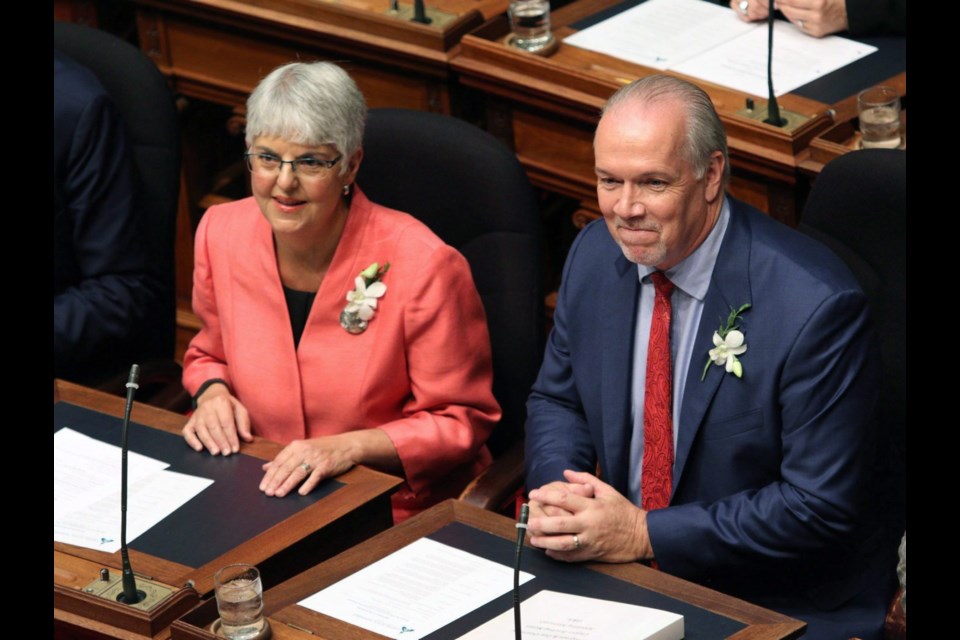Finance Minister Carole James delivered a budget that appears to be a sensible start on filling all the service gaps the party highlighted during the campaign.
But there’s a sense of unease about one external factor that could upset the new government’s plans for financing all the new spending to which the government is committed. It’s interest rates. James noted that various banks are warning about the impact interest-rate hikes would have on the province.
Finance ministers routinely list the risk factors, but her notice was significant because so much of B.C.’s economic performance is based on super-heated real-estate prices that are super-sensitive to interest rates.
Cooling the housing market would be welcome for many. But chilling it could also dampen the multibillion-dollar surpluses and the extraordinary GDP growth rate that B.C. has been posting. The NDP inherited a vibrant fiscal situation, but much of the prosperity spins off from the huge house prices. If the party’s coming to an end, it’s going to be tougher to find the funds for the government’s agenda.
The budget listed $1.8 billion in new spending over three years on housing, education and social programs, and that is just a start on what was promised. “Commitments are being funded by improved revenue forecasts over the fiscal-plan period,” plus the tax hikes.
They include:
• Increasing the corporate income tax rate one point, to 12 per cent. The nine per cent increase will raise about $300 million a year. The B.C. rate will be still be among the lowest in Canada and the increase has been signalled by the party for years, so business reaction was muted.
• The top tax rate for high-income earners is being increased to 16.8 per cent, from 14.7. That’s a 12 per cent increase in the rate for people whose taxable income is more than $150,000. A $200,000 earner would pay about $1,000 more.
Liberals raised that rate temporarily to dig the government out of the red during the deficit years, then dropped it once the budget was balanced. The NDP objected and have promised to raise it back ever since.
• The carbon tax, frozen for the past several years, is being raised every spring for the next four years to a rate that’s two-thirds higher. The tax amounts to 6.6 cents a litre at the gas pump and will be 11 cents a litre by 2021. As well, the revenue-neutrality concept is being abandoned.
Carbon-tax revenue had to be offset by cuts in other taxes under the old regime, which curtailed government inclinations to spend the money. Now the billion-dollar-plus pool of revenue will be available for spending on transit and green incentives.
The federal government has imposed a similar escalator on carbon pricing, but B.C.’s rate will stay higher throughout. The move is easily defensible as a climate-change measure, but the NDP is about to find out if theoretical support for such moves survives in the real world at the pumps.
The three tax hikes are offset slightly by three smaller tax cuts. A specific tax on credit unions was cut, the sales tax on electricity was dropped and the small-business rate was lowered slightly.
Monday’s picture was clear, as far as it went. The government is a bit anxious about interest rates, but is counting on continued growth and a net $881 million a year in new taxes to fund the promises it’s acting on this year.
The trouble is, there are lots of promises they haven’t gotten to yet. The $10-a-day child care, the $400 renters’ rebate, ferry-fare rollbacks and the freeze on hydro rates had to be put off because of the delayed-reaction election results. But they’re still on the record, and they’re expensive. So is the ICBC rescue mission, and the move to eliminate MSP premiums.
The NDP needs smooth economic sailing to bring in the revenue for those ventures, and higher interest rates make you wonder about the forecast.



